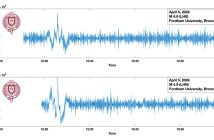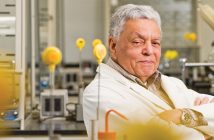Scientists who study the effects of human activity on the global climate should not be afraid to speak up when their expertise can help shape policy matters.
That was one of the messages Williams H. Schlesinger, Ph.D., had for attendees of Fordham University’s Calder Summer Undergraduate Research Program (CSUR) 2009 symposium, which was held Wednesday, August 12 at the Rose Hill campus.
“Environmental scientists, who are very much part of this, are reluctant to come forward. We feel like speaking out on some of these issues in some way contaminates or compromises our science and or integrity and how we are looked at by other scientists,” Schlesinger said to students and teachers in the Walsh Family Library’s Flom Auditorium.

William Schlesinger Photo by Angie Chen
“I disagree with that,” he said. “I think that if you speak out in the field of expertise on issues that are important to the country and the world, you’re fulfilling your rights as a citizen to have input in the process, and probably your input is better than the random input from lobbyists and people with vested economic interests.”
Schlesinger, president of the Cary Institute of Ecosystem Studies in Millbrook and the former dean and James B. Duke professor of biochemistry at the Nicholas School of Environment and Earth Sciences at Duke University, delivered his remarks after his keynote speech, “Human Impacts of on the Chemistry of the Surface of the Earth.”
In his lecture, Schlesinger outlined the methodology he uses to measure the amount of elements such as carbon and nitrogen that has been added to the land, water and air thanks to human activity. A poignant example of this, he said, is a study that examined French wines from the early 1960s to the early 1990s and found that levels of lead peaked in 1978, around the same time that use of leaded gasoline peaked. Scientists had estimated that every gallon of gas burned mobilized 2 or 3 grams of lead into the atmosphere, and once its use was curtailed, levels dropped drastically.
“I know that when you pick up a field guide for mammals, it doesn’t have a picture of a human being in it, and so we often kind of disassociate ourselves from being part of it of the natural biosphere, and I think that’s really unfortunate,” he said. “Homo sapiens needs to be listed there as a species that happens to be dominant on the planet today and has huge impacts on its surface chemistry.”
Schlesinger’s keynote kicked off the presentation of individual student research projects by 12 CSUR participants, including six from Fordham. The CSUR program, which is funded by a four-year, $324,471 grant from the National Science Foundation, enables undergraduates to conduct hands-on research at the Calder Center and surrounding sites, such as the Black Rock Forest and area rivers and reservoirs, under the supervision of faculty mentors.
Alison Cucco, a senior at Rose Hill, for instance, presented the findings of “Urban effects on nitrogen cycling and plant growth,” a seven-week study in which she visited fives sites around the New York Metropolitan area to test a hypothesis that nitrogen levels decrease as one gets further from metropolitan areas.
Another presenter was Lily Hughes, a junior at Clark University who spent her summer capturing and examining mosquitoes, an insect which, along with ticks, the Calder Center is particularly well suited to study. In the course of trying to learn which trap is best for catching gravid—or pregnant—mosquitoes, she found that the population of the native Culex Pipien species had fallen, perhaps due to the heavy rainfall in June. In their place, the numbers of the invasive Aedes japonicus species, which carries the West Nile virus, had risen.


